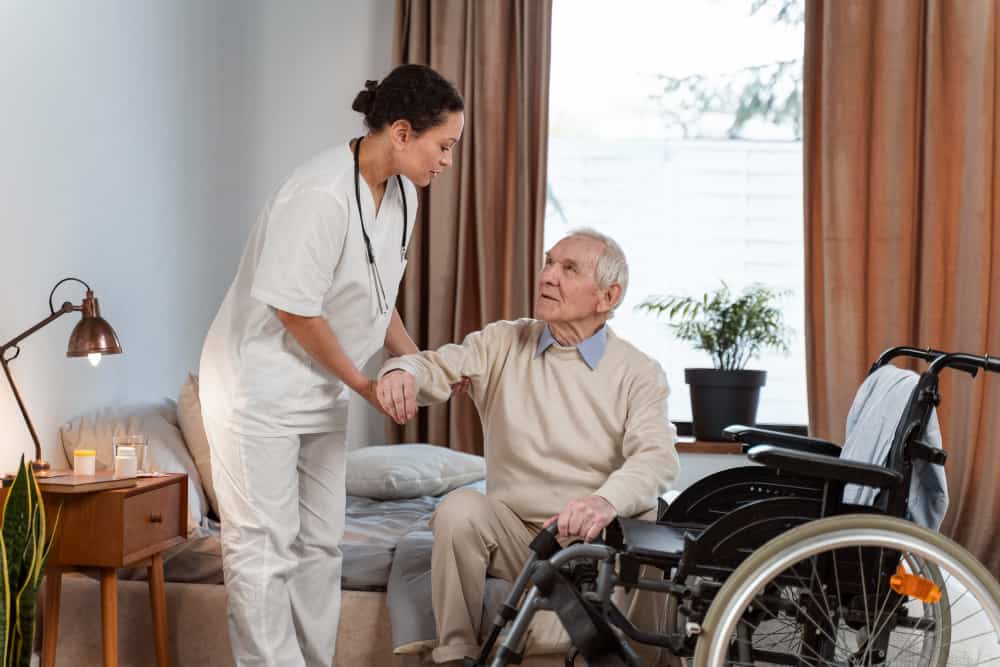As the demographic landscape shifts with an increasing number of the global population entering their senior years, the necessity for cutting-edge healthcare solutions becomes more apparent. By 2050, it's projected that 22% of the global population will be aged 60 and older, highlighting the growing need for the healthcare industry to evolve and innovate. This article explores the latest trends in elderly care, particularly within the context of care homes, offering both opportunities and solutions to enhance the quality of life for our aging population.
1. Telemedicine and Remote Health Monitoring
Telemedicine is transforming the approach to elderly care in
care homes, especially in remote or underserved locations. Through remote
monitoring technologies, caregivers can continuously track vital health data
from heart rate to glucose levels, allowing for immediate medical decisions and
reducing the frequency of hospital visits. This proactive health management is
crucial for managing chronic conditions effectively within care home settings.
2. Artificial Intelligence Enhancing Geriatric Care
Artificial intelligence (AI) is crucial in
revolutionizing geriatric care. AI's ability to perform predictive analytics helps
forecast health trends and potential emergencies, enabling personalized care
plans tailored to each resident's specific needs. Additionally, AI-driven tools
like chatbots and virtual assistants provide companionship and routine
assistance, addressing the common issue of loneliness and promoting mental
health among care home residents.
3. Integration of Smart Home Technologies
Incorporating
smart home technology into care homes significantly boosts the independence and
safety of residents. Devices equipped with sensors can detect falls, monitor
movement, and manage medication, providing peace of mind for both residents and
their families. Such technologies empower seniors to maintain a semblance of
independence under the watchful guidance of their caregivers.
4. Innovations in Mobility Aids
Advanced
mobility aids are key to enhancing the freedom and safety of elderly residents,
reducing fall risks, which are a significant concern in care environments.
Innovations range from modern exoskeletons to sophisticated wheelchairs and
robotic walkers, all designed to support older people in moving safely both
indoors and outdoors, thus catering to their varying mobility needs.
5. Cognitive Health Innovations
Maintaining
cognitive health is a top priority in elderly care strategies. Care homes like oakdalecarehome.co.uk have created programs that fit residents' physical
abilities and encourage brain use and social interaction. Care homes are also increasingly
adopting brain training software and virtual reality (VR) programs to boost
mental agility and delay cognitive decline. Ongoing research into
neuroprotective therapies shows promise in slowing the progression of cognitive
diseases such as Alzheimer's and dementia.
6. Collaborative Care Models
Collaborative
care models are becoming essential in care homes as they integrate a range of
healthcare providers, social services, and family support to address all
aspects of an elderly patient's well-being—mental, physical, and social. This
comprehensive approach ensures that care is not only effective but also
compassionate and tailored to individual needs.
7. Advances in Regenerative Medicine
Regenerative
medicine is offering new hope in care homes by utilizing therapies that involve
stem cells and biocompatible materials to repair or replace damaged tissues.
This rapidly advancing field holds the potential to significantly alleviate
chronic conditions and enhance the general health and vitality of elderly
patients.
These trends
highlight not just technological advancements but also a shift towards more
personalized and proactive care approaches that cater specifically to the
unique requirements of older people in care homes. The ongoing innovations in
this field are pivotal to enhancing the quality of life for seniors, managing
the complexities of their health needs effectively, and ultimately providing a
supportive and nurturing environment in their golden years.









0 Comments